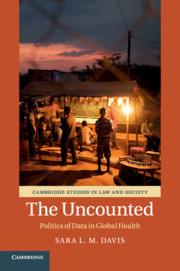Book contents
- The Uncounted
- Cambridge Studies in Law and Society
- The Uncounted
- Copyright page
- Contents
- Figures
- Tables
- Abbreviations and Terms
- Chapter 1 Contested Indicators
- Chapter 2 The Uncounted: Key Populations
- Chapter 3 “Something More than Data”
- Chapter 4 Cost-Effectiveness and Human Rights
- Chapter 5 Modeling the End of AIDS
- Chapter 6 Sustainability, Transition, and Crisis
- Chapter 7 Listening to Women
- Chapter 8 “So Many Hurdles Just to Leave the House”
- Chapter 9 The Panopticon and the Potemkin
- Chapter 10 Data from the Ground Up
- Reflection Questions
- Acknowledgments
- References
- Index
- Cambridge Studies in Law and Society
Chapter 2 - The Uncounted: Key Populations
Published online by Cambridge University Press: 18 May 2020
- The Uncounted
- Cambridge Studies in Law and Society
- The Uncounted
- Copyright page
- Contents
- Figures
- Tables
- Abbreviations and Terms
- Chapter 1 Contested Indicators
- Chapter 2 The Uncounted: Key Populations
- Chapter 3 “Something More than Data”
- Chapter 4 Cost-Effectiveness and Human Rights
- Chapter 5 Modeling the End of AIDS
- Chapter 6 Sustainability, Transition, and Crisis
- Chapter 7 Listening to Women
- Chapter 8 “So Many Hurdles Just to Leave the House”
- Chapter 9 The Panopticon and the Potemkin
- Chapter 10 Data from the Ground Up
- Reflection Questions
- Acknowledgments
- References
- Index
- Cambridge Studies in Law and Society
Summary
The key populations who are most vulnerable to HIV – sex workers, people who inject drugs, men who have sex with men, transgender people – are criminalized in many countries, and often lead double lives, hiding in order to survive. This creates a data paradox, in which governments deny or minimize the existence of key populations, no research is done on their health needs, and lack of data reinforces official denialism. Criminalization of same-sex sexuality is statistically associated with implausibly low size estimates of men who have sex with men. Low size estimates can also contribute to implausibly high reported coverage of HIV testing among men who have sex with men, leading countries that are failing to reach key populations to mistakenly believe they are successful. In Kenya, a government effort to conduct a size estimation study of key populations, including gathering biometric data, faced resistance from those groups, who feared the data could expose them to risk of arrest and abuses. Working with Kenyan key populations advocates and human rights lawyers, the author documented this resistance, and growing demands by key populations that they play a leadership role in the design, implementation and evaluation of research about their health.
Keywords
- Type
- Chapter
- Information
- The UncountedPolitics of Data in Global Health, pp. 45 - 64Publisher: Cambridge University PressPrint publication year: 2020

